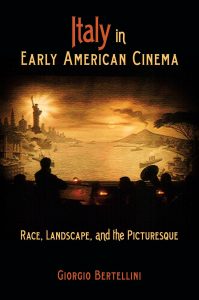A film and media history scholar, who specializes in the traffic of films, peoples, and cultural forms between Italy and the U.S., Giorgio Bertellini is Professor in the Departments of Film, Television, and Media and Romance Languages and Literatures at the University of Michigan. Born in Mantua, Italy, he studied philosophy in Milan and cinema studies in New York, where he earned a PhD from the Tisch School of the Arts (NYU).
Author of a monograph (Italian, 1996; rev. and expanded ed. 2011; English ed. 2014; Romanian trans. 2017) and editor of an anthology of critical writings (1995) on Sarajevo-born director Emir Kusturica, he has published numerous essays on questions of geographic, racial, and national space in Italian and silent cinema. His work has appeared in three dozen anthologies and in such journals as Cinema Journal, Early Popular Visual Culture, Film History, Film Quarterly, The Italian American Review, The Journal of Urban History, Kintop, Urban History, and The Velvet Light Trap, among others.
Editor of “The Cinema of Italy” (Wallflower Press, 2004; 2007) and co-editor (with Richard Abel and Rob King) of “The Nation/National in Early Cinema” (John Libbey, 2008), he is the author of “Italy in Early American Cinema: Race, Landscape, and the Picturesque” (Indiana University Press, 2010), winner of the American Association for Italian Studies Book Award and of the Robert K. Martin Prize for Best Book sponsored by the Canadian Association of American Studies. The book also received a Finalist Mention from the American Studies Association for the Lora Romero Prize/First Book Award (2010) and a Short List Mention from the Modernist Studies Association for its 2010 Book Award.
In 2013 he edited “Italian Silent Cinema: A Reader” (John Libbey/Indiana UP), the first and so far only anthology on this national film industry, consisting of the essays of about 30 scholars on a a variety of topics, including production companies, distribution, reception, genre, stardom, and archival research. The volume was the winner of the Southwest Popular and American Culture Association’s 2015 Peter C. Rollins Book Award in the category of Film and Television. It was also “Shortlisted and Highly Commended” for the Kraszna-Krausz Foundation’s Best Moving Image Book Award, 2014 and a Finalist for the 2013 Richard Wall Memorial Award, Theatre Library Association (New York).
Translated into Chinese, French, Italian, Romanian, Slovenian, and Spanish, his work has been supported by the Michigan Society of Fellows, Consiglio Nazionale delle Ricerche, Fondazione Bellonci, the Radcliffe Institute for Advanced Studies at Harvard, and the American Philosophical Society.
His latest volume, The Divo and the Duce: Promoting Film Stardom and Political Leadership in 1920s America (University of California Press, 2019) studies how Italian-born star Rodolfo Valentino and Italy’s dictator Benito Mussolini became surprising paragons of authoritarian male power and mass appeal in the U.S. thanks to the efforts of public opinion managers, including publicists, journalists, and even ambassadors. Beyond the democratic celebrations of the Jazz Age, I argue, the promotion of their charismatic masculinity through spectacle and press coverage inaugurated the now-familiar convergence of popular celebrity and political authority. Bertellini expanded on his book’s relevance for the present times in an article published in the Washington Post‘s Blog Post “Made by History.” Covered in Corriere della Sera/La Lettura, The Divo and the Duce has also been reviewed in Il Manifesto/ALIAS, The Sidney Morning Herald, CHOICE, H-NET/H-Italy, The Journal of Italian Cinema and Media Studies, CINERGIE, and Studi Emigrazione, among others.
He is currently Associate Editor of the The Journal of Italian Cinema and Media Studies and co-editor (with Richard Abel and Matthew Solomon) of the University of California Press book series Cinema Cultures in Contact.
Some of Bertellini’s books:
. 
 .
.






